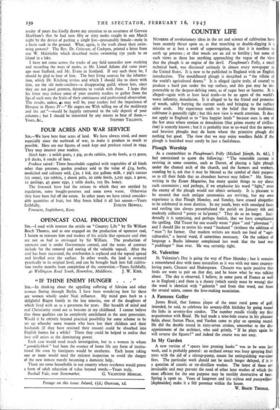COUNTRY LIFE
NUMBERS of revolutionary ideas in the art and science of cultivation have been recently thrust upon us, as that trenching or double-digging is a 'mistake or at best a work of supererogation, or that it is needless to earth up potatoes ; or that weeds are an aid to fertility ; but none of such views as these has anything approaching the vogue of the view that the plough is an engine of the devil. Ploughman's Folly, a small technical book, was discussed seriously in almost every newspaper in the United States. It is now to be published in England with an English introduction. The mouldboard plough is described as " the villain of the world's agricultural drama." It is alleged (quite truly, of course) to produce a hard pan under the top surface, and this pan may be im- penetrable to the deepest-delving roots, as of sugar beet or lucerne. It is alleged—again with at least local truth—to be an agent of the world's worst infirmity, denudation. It is alleged to be the friend and protector of weeds, safely burying the current seeds and bringing to the surface older seeds. My experience tends to the belief that the traditional cultivator is generally right ; but this new view is worth attention. It does not apply to England as to " less happier lands " because ours is one of the few areas where erosion or denudation (that prime enemy of civilisa- tion) is scarcely known ; but it is probably true to us-ward that the newest and heaviest ploughs may do harm where the primitive plough did nothing but good. The view that we may enjoy weedless fields if the plough is banished must surely be just a foolishness.
Plough Worship As a counterblast to Ploughman's Folly (Michael Joseph, 8s. 6d.), I feel constrained to quote the following: "The venerable custom is reviving in some counties, such as Dorset, of placing a light plough under the chancel arch of the church, and the farmers and workers, standing by it, ask that it may be blessed as the symbol of their purpose so to till their fields that an abundant harvest may follow." Mr. Stone, writing in the Estate Magazine, has many quaint things to say about such ceremonies ; and perhaps, if we emphasise his word "light," even the enemy of the plough would not object seriously. It is pleasant to be assured that such antique ceremonies are reviving, but my own experience is that Plough Monday, and Sunday, have ceased altogether to be celebrated in most districts. In my youth, boys with smudged faces and rattling tins always perambulated the parish on January 6th and modestly collected " penny or ha'penny." They do so no longer. Inci- dentally it is surprising, and perhaps foolish, that we have complicated the spelling. Old Tosser for one usually wrote "plow " and " plowman" ; and I should like to revive his word "husband" (without the addition of " man") for farmer. Our modern writers are much too fond of "agri- culturalist," a horrid word, if sometimes necessary. On the subject of language a Bucks labourer complained last week that the land was " puddinger " than ever. He was certainly right.
St. Valentine
St. Valentine's Day is going the way of Plow Monday ; but it remains a remembered date with most naturalists as it was with our most country- loving poets, Chaucer and Shakespeare. Chaucer was quite positive that birds are wont to pair on that day, and he knew what he was talking about. The day is observed, I believe, in some parts of France as well as in England ; and there is a theory (which surely must be wrong) that the word is identical with " galentin " and from that word, not from the several saints, comes the love-making association.
A Famous Golfer
James Braid, that famous player of the most rural game of golf, intended,.he said, to celebrate his seventy-fifth birthday by going round the links in seventy-five strokes. The number recalls vividly my first acquaintance with Braid. He had made a nine-hole course in his pleasant fields about Sutton Place, and Vardon came to play an opening round. He did the double round in sixty-seven strokes, somewhat to the dis- appointment of the architect, who said grimly, " If he plays again he will reverse the figures!" and indeed the course was not easy.
In My Garden
A new version of " spears into pruning hooks " was to be seen last week, and is probably general: an orchard owner was busy spraying fruit trees with the aid of a stirrup-pump, meant for extinguishing war-time fires. The particular work should not be much longer delayed, if it is a question of caustic or tar-distillate washes. The latest of these are invaluable and may prevent the need of other later washes of which the most efficient for the one purpose may be terribly destructive of bees. Spring is upon us. Vases of lungwort and iris stylosa and pussywillow (daphnoides) make it a felt presence within the house.
W. BEActi Thomas.


























 Previous page
Previous page